4 Symptoms of Bad Spark Plug Wires (and Replacement Cost)
Spark plug wires channel ignition energy to fire cylinders. But an engine’s plug wires are subject to a significant amount of thermal and electrical stress, thereby making them prone to eventual failure.
Keep reading to learn the common warning signs of spark plug wire failure, how long they typically last, how much replacing them will cost, and whether it’s worth it to use “high performance” plug wires.
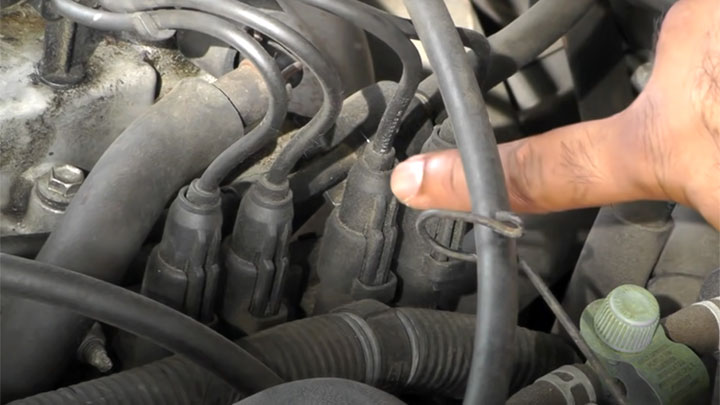
Bad Spark Plug Wire Symptoms
The presence of one or more faulty spark plug wires is often accompanied by a host of secondary symptoms. Learning to recognize these symptoms can prove quite valuable when attempting to remedy the situation at hand, and return a vehicle to proper operating condition in an expedited fashion.
The following are several of the most common symptoms associated with a bad spark plug wire.
#1 – Rough Idle
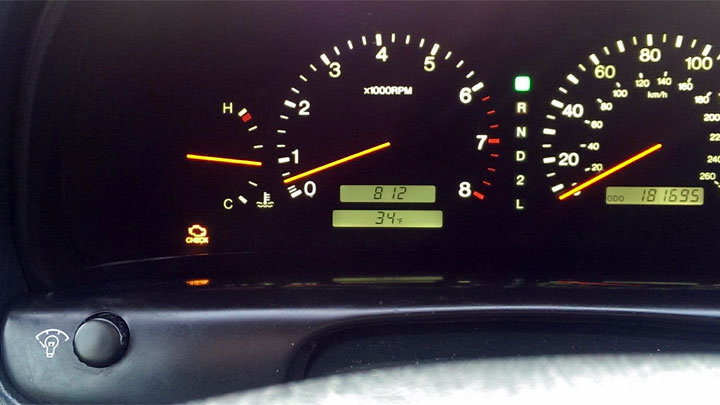
One of the most common symptoms of a bad spark plug wire is a rough, irregular, or erratic idle. This can often be felt when sitting at a stop light and will make a vehicle feel as if it has a slight shimmy of sorts.
This poor idle results from a relative imbalance from one respective cylinder to the next.
#2 – Misfire
Another symptom of a faulty spark plug wire is a noticeable misfire on at least one cylinder. This condition is often most notable under periods of heavy throttle demand and can be felt as a hesitation, or noticeable reduction in power.
A misfiring engine also tends to present an audible loping noise when under load as well.
#3 – Backfire
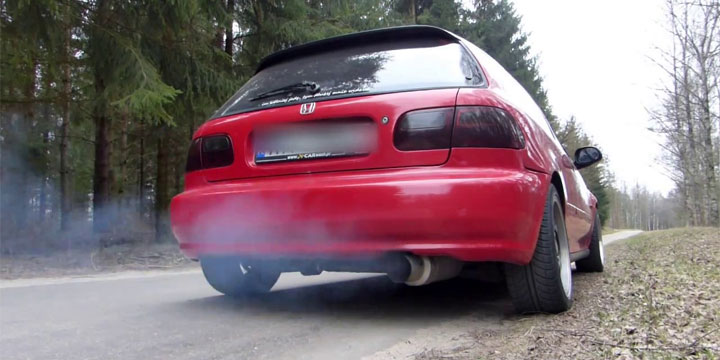
In certain cases, the presence of spark plug wire failure will cause an engine to backfire, as a result of incomplete or inefficient combustion. This backfiring is typically accompanied by a certain level of hesitation or power loss when an engine is under a load.
#4 – Check Engine Light
In many instances, a misfire caused by a faulty spark plug wire will be recognized by a vehicle’s Engine Control Module (ECM). When this occurs, a corresponding misfire code is logged, and a vehicle’s check engine light is illuminated.
Luckily, this can prove to be quite a helpful diagnostic aid, as misfire DTCs can often be traced back to a specific cylinder. Common misfire-related codes include: P0300, P0301, P0302, P0303, P0304, and so on.
What Do Spark Plug Wires Do?
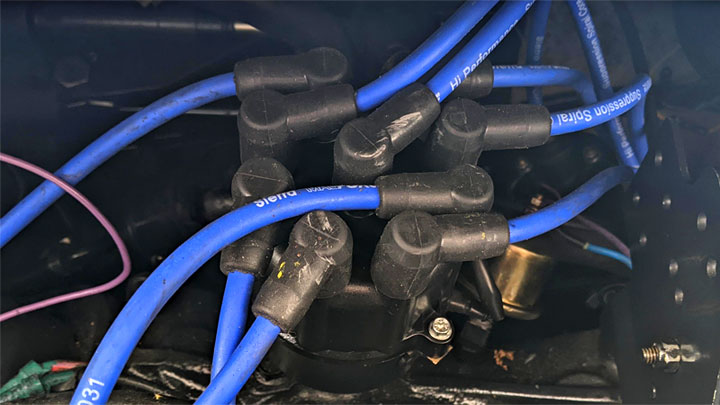
Spark plug wires carry moderately high-voltage current from its point of introduction at an engine’s distributor cap, to its terminating destination, the spark plug. An engine featuring a standard distributor-driven ignition system utilizes one spark plug wire for each respective cylinder.
Power delivered via an engine’s spark plug wires originates at the ignition coil, before being directed to the vehicle’s distributor cap. An engine’s distributor is timed to coincide with an engine’s firing order, thereby discharging inlet power via a specified connection point, which is fed by a revolving rotor button and a set of cylinder-specific contacts.
Power is discharged through each respective plug wire, before ultimately reaching a spark plug located at each wire’s terminating end. This energy then dissipates, as it arcs between a spark plug’s central and side or ground electrodes.
The resulting arc is therefore responsible for igniting the volatile air/fuel mixture found within each combustion chamber.
Do All Vehicles Have Spark Plug Wires?
All gasoline-powered internal combustion engines rely upon spark as a source of ignition and feature head-mounted spark plugs. However, not all spark plugs require the use of spark plug wires.
While this might seem somewhat contradictory, one needs to look no further than the modern coil-on-plug ignition systems found in many of today’s vehicles for further understanding.
Over the past couple of decades, many automakers have begun utilizing coil-on-plug arrangements, rather than traditional distributor-driven ignition systems. Systems of this nature do not feature a standard distributor or plug wires, instead opting for the use of individual, cylinder-specific coils, mounted directly to a spark plug via a unitized boot.
What Causes the Wires to Go Bad?
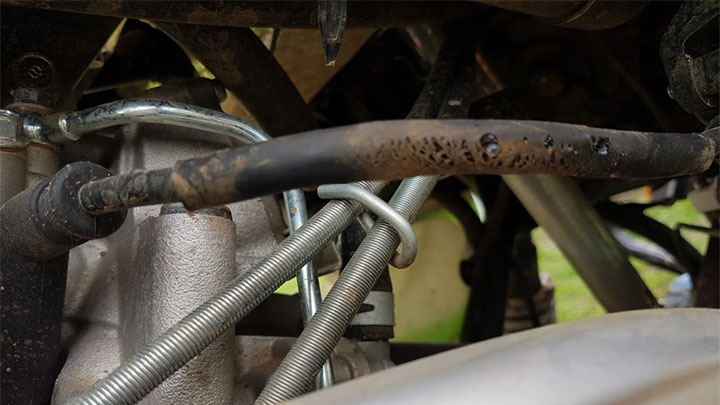
Spark plug wires can actually fail for one of several different reasons.
#1 – Thermal Stress
Though spark plug wires are insulated quite heavily, and are designed to withstand extensive heat, their typical location within close proximity to an engine’s exhaust manifold makes them ripe for eventual heat degradation.
When this occurs, a plug wire’s insulator will become overly brittle, presenting spark energy with a path to ground.
#2 – Friction
The wires can also succumb to friction. This occurs when an engine’s spark plug wires rub and chafe along rough or sharp edges, ultimately wearing a hole in the wire’s protective insulator. Just like in the example above, this newly compromised section of insulator provides a viable path to ground for electrical energy.
Issues of this type are especially prominent whenever an engine’s plug wires are not secured within their stock retainers.
#3 – Vibration
Prolonged exposure to vibration is yet another leading cause of spark plug wire failure. A vehicle’s engine is constantly shaking and vibrating, causing a certain degree of fatigue within a spark plug wire’s internal filaments.
Over time, this will cause excess resistance to build within a spark plug wire itself, thereby causing overheating and further degradation to take place. In severe cases, a the wire’s insulator can even begin to melt.
How Long Do Spark Plug Wires Last?
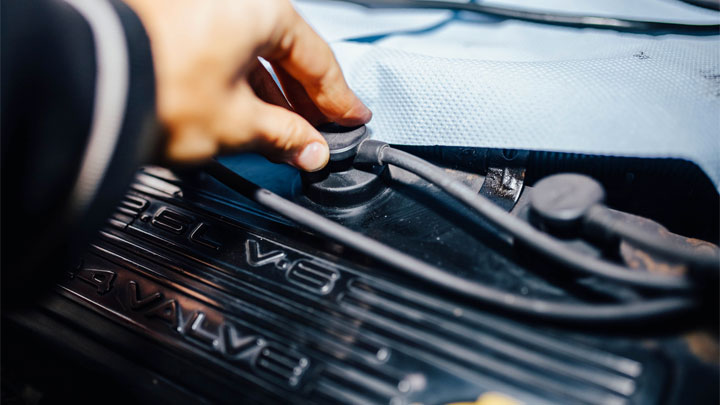
The average service life of a set of spark plug wires tends to be approximately 60,000-80,000 miles, though the ultimate failure of one or more plug wires can actually take place much earlier, or later.
However, it is important to replace an engine’s spark plug wires as a matter of preventive maintenance, instead of waiting for their failure, whenever possible. This can prevent a host of additional mechanical issues from arising along the way.
If allowed to degrade to the point of failure, a compromised spark plug wire will create a misfire condition. This condition itself can lead to down-range fuel dosage and complete catalytic converter failure with time. This, in turn, leads to an array of otherwise unnecessary expenses being accumulated.
Are Spark Plug Wires Universal?
Not all spark plug wires are created equally. In fact, most spark plug wires are designed for the specific application that they are intended for. This makes the majority of spark plug wires far from universal in nature.
Most importantly, the bulk of today’s plug wires are constructed to a specified length, allowing them to fit perfectly on the engine for which they are specified.
Nonetheless, one can still order generic spark plug wires that are intended to be cut to length, as called for on an application-specific basis. However, preparing these wires for use requires a little additional time and planning. Spark plug wires of this type are usually clearly labeled as “universal” on their packaging.
Spark Plug Wires Replacement Cost
Best places to order parts? See: 19 Best Online Auto Parts Stores
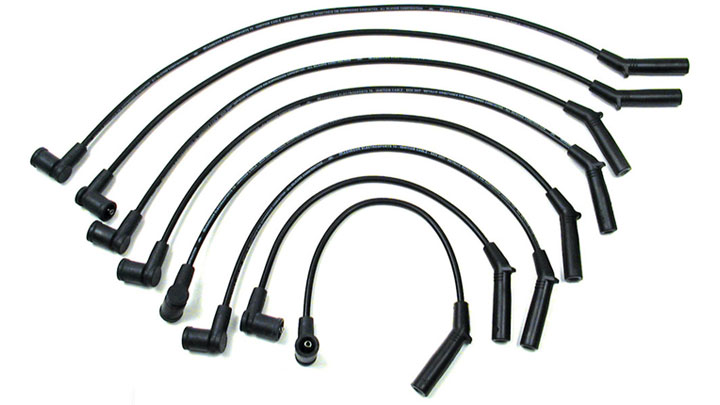
On average, one can typically expect to pay somewhere between $150-$250 to have their vehicle’s spark plug wires replaced. Approximately $75-$100 of this amount will be directed toward parts acquisition, while the other $75-150 dollar will reflect applicable labor.
The total amount spent to replace a vehicle’s spark plug wires also commonly differs, based upon the going labor rate adhered to by an individual’s shop of choice.
Replacing your own spark plug wires can be an excellent way to save money. Repair of this type is relatively straightforward and can be completed with ease by almost any individual with a basic sense of mechanical know-how.
Little in the way of specialty tools is required for spark plug wire replacement, further adding to the simplicity of the job. A good vehicle-specific repair manual will provide you step-by-step instructions although YouTube or online forums are also good sources in some cases.
Related: Average Cost to Replace Spark Plugs
Are “High Performance” Wires Worth the Money?
High-performance spark plug wires are generally intended for use on racing vehicles, or in other heavy-duty applications.
The spark plug wires are constructed in a somewhat heartier fashion and tend to provide excellent insulation from interference, without causing heightened circuit resistance. This ensures that the “hottest” possible spark is delivered downstream.
However, for average daily driving applications, high-performance plug wires can serve as overkill. Spark plug wires of this construction provide little advantage over the use of standard plug wires in the average application, thereby equating to little more than an unnecessary expenditure.
Should Spark Plugs Be Replaced At the Same Time?
Ideally, spark plugs, as well as spark plug wires, should be replaced as a complete set whenever possible. This stems from the simple notion that no one plug or plug wire is likely to be any newer than the one earmarked for replacement.
Therefore, replacing spark plugs or spark plug wires in a complete set replaces not only the faulty component but all other similar components of the same vintage as well.
Practicing this method of maintenance saves both time and labor over the long-haul, while also reducing the chance of incurring similar failures within short order. This can be of significant value when attempting to keep a vehicle on the road, in the most reliable form possible.
Read Also: 9 Spark Plug Conditions and What They Mean
- Car Temperature Gauge Stopped Working? (Here’s Why) - Apr 15, 2024
- Ignition Coil vs Coil Pack (What’s the Difference?) - Apr 8, 2024
- Windshield Wipers Won’t Turn Off? (Causes and What to Do) - Apr 5, 2024
